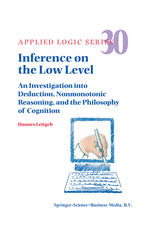

Most ebook files are in PDF format, so you can easily read them using various software such as Foxit Reader or directly on the Google Chrome browser.
Some ebook files are released by publishers in other formats such as .awz, .mobi, .epub, .fb2, etc. You may need to install specific software to read these formats on mobile/PC, such as Calibre.
Please read the tutorial at this link: https://ebookbell.com/faq
We offer FREE conversion to the popular formats you request; however, this may take some time. Therefore, right after payment, please email us, and we will try to provide the service as quickly as possible.
For some exceptional file formats or broken links (if any), please refrain from opening any disputes. Instead, email us first, and we will try to assist within a maximum of 6 hours.
EbookBell Team

4.1
20 reviewsIn contrast to the prevailing tradition in epistemology, the focus in this book is on low-level inferences, i.e., those inferences that we are usually not consciously aware of and that we share with the cat nearby which infers that the bird which she sees picking grains from the dirt, is able to fly. Presumably, such inferences are not generated by explicit logical reasoning, but logical methods can be used to describe and analyze such inferences.
Part 1 gives a purely system-theoretic explication of belief and inference. Part 2 adds a reliabilist theory of justification for inference, with a qualitative notion of reliability being employed. Part 3 recalls and extends various systems of deductive and nonmonotonic logic and thereby explains the semantics of absolute and high reliability. In Part 4 it is proven that qualitative neural networks are able to draw justified deductive and nonmonotonic inferences on the basis of distributed representations. This is derived from a soundness/completeness theorem with regard to cognitive semantics of nonmonotonic reasoning. The appendix extends the theory both logically and ontologically, and relates it to A. Goldman's reliability account of justified belief.